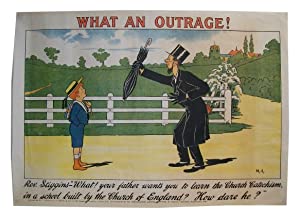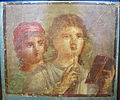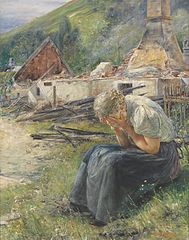Every time I am invited to a Christmas party, I have to decide whether I should go. If it’s a friend asking me to share their celebration of their Christmas, I accept with joy. If it’s a public or professional event that’s called a “Christmas Party”, one of the implications is that if I don’t accept Christmas as a part of my life, then I am not really acceptable as I am, with my own views and culture, in that environment.
Not that the organisers articulate it in this way. Recently, when I asked a professional group what they meant by “Christmas” they explained that it was secular. While this was perfectly acceptable for them, they demonstrated that a secularised version of a religious celebration was seen as acceptable for all shapes of religion and belief because they explained to me (and they know I’m Jewish) that it was secular for me, too. This tells those of us without Christian backgrounds that there is a certain way we should live our lives.
How the lead-up to Christmas is depicted in Australia is related to this. There is an “Advent” book box being advertised right now. It takes the word “Advent” (which refers to a very particular coming birthday) and one can open one wrapped book a day from 1 December until Christmas Day. I’m told it is, also, not religious. But there are never any book boxes for the festivals of other religions. Instead, we are all asked to accept the redefined religious words for Christianity.
Whether these explanations work for me, for you, for someone else, depends on our background.
For me, it creates a disjuncture between the home and the outside world. The values in my home are Jewish, and my parents taught me that I should not celebrate others’ festivals for myself. Why? It’s an acceptance that their religion takes precedence over my own. In their homes, that’s a sign of respect. In my home, why don’t my own traditions and belief take precedence? In public events and shared places, explaining that a thing is secular not only sets the Christian festival as something that is shared by everyone (when it, frankly, is not) but it also rubs it in that my views do not matter.
The fact that someone explaining Christmas to me as secular shows how they set their own atheism in a cultural context. It also demonstrates that they’re not listening to people who have different contexts.
Cultural respect and religious respect involve understanding how the person we’re talking to sees the subject we’re talking about. This entails accepting multiple interpretations of an event. Do you leave someone out of a group because they can’t eat peanuts? Or do you make sure that there is shared food everyone can eat?
This is my annual rant on the subject. Shorter than usual because it’s 1 am here and bed beckons.
I shall skip the Christmas party, because I’m not convinced the person organising knows much about Christianity. Also, I won’t buy the books. Instead, on the day of the party, I shall tell anyone who wants to hear my two favourite miracles for St Nicolas (the children and the bones, for anyone who has had to suffer my tale-telling) for the party is on his holy day and he’s the bloke who became Santa Claus. I need to practise what I preach, in other words. If you who want to hear about the pickled children and how they are Santa’s backstory, please ask.
On the book-front, I’m doing my own thing. I will send book parcels on behalf of anyone who wants to give presents to friends and family in Australia. This is actually not my response to the religion issue. It’s my response to books being a bit difficult to buy and to international mail being a lost cause. If you know anyone wants to give presents to anyone in Australia over the next few weeks, check here: https://gillianpolack.com/sale-until-18-december-or-until-the-books-run-out/
I have nothing against presents (I adore presents), after all. My objection is to people who insist that my own background doesn’t matter a jot.


 The internet is practically an engraved invitation to indulge in gossip and rumor. It’s so easy to blurt out whatever thoughts come to mind. Once posted, these thoughts take on the authority of print (particularly if they appear in some book-typeface-like font). Have you ever noticed how much easier it is to question something when it appears in Courier than when it’s in Times New Roman? For the poster of the thoughts comes the thrill of instant publication. Only in the aftermath, when untold number have read our blurtings and others have linked to them, not to mention all the comments and comments-on-comments, do we draw back and realize that we may not have acted with either wisdom or kindness.
The internet is practically an engraved invitation to indulge in gossip and rumor. It’s so easy to blurt out whatever thoughts come to mind. Once posted, these thoughts take on the authority of print (particularly if they appear in some book-typeface-like font). Have you ever noticed how much easier it is to question something when it appears in Courier than when it’s in Times New Roman? For the poster of the thoughts comes the thrill of instant publication. Only in the aftermath, when untold number have read our blurtings and others have linked to them, not to mention all the comments and comments-on-comments, do we draw back and realize that we may not have acted with either wisdom or kindness. The COVID-19 pandemic has been raging for many months now, marked from the onset by lies about the disease, its origins, its treatment, and its prevention. No aspect of the pandemic has been free from controversy and misinformation. In the middle of flame wars and whack-a-mole efforts to squelch anti-vaccine, anti-mask internet sites lies the confusion and grief of those who have lost loved ones to this disease (over 700,000 in
The COVID-19 pandemic has been raging for many months now, marked from the onset by lies about the disease, its origins, its treatment, and its prevention. No aspect of the pandemic has been free from controversy and misinformation. In the middle of flame wars and whack-a-mole efforts to squelch anti-vaccine, anti-mask internet sites lies the confusion and grief of those who have lost loved ones to this disease (over 700,000 in